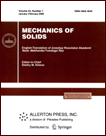 | | Mechanics of Solids
A Journal of Russian Academy of Sciences | | Founded
in January 1966
Issued 6 times a year
Print ISSN 0025-6544
Online ISSN 1934-7936 |
Archive of Issues
| Total articles in the database: | | 13492 |
| In Russian (Èçâ. ÐÀÍ. ÌÒÒ): | | 8178
|
| In English (Mech. Solids): | | 5314 |
|
| << Previous article | Volume 55, Issue 5 / 2020 | Next article >> |
| I.G. Goryacheva and A.A. Yakovenko, "Modelling of Cylinder Indentation into a Viscoelastic Layer," Mech. Solids. 55 (5), 654-663 (2020) |
| Year |
2020 |
Volume |
55 |
Number |
5 |
Pages |
654-663 |
| DOI |
10.3103/S0025654420050088 |
| Title |
Modelling of Cylinder Indentation into a Viscoelastic Layer |
| Author(s) |
I.G. Goryacheva (Ishlinsky Institute for Problems in Mechanics of the Russian Academy of Sciences, Moscow, 119526, Russia, goryache@ipmnet.ru)
A.A. Yakovenko (Ishlinsky Institute for Problems in Mechanics of the Russian Academy of Sciences, Moscow, 119526, Russia, anastasiya.yakovenko@phystech.edu) |
| Abstract |
The indentation of a rigid cylinder with a flat base into a viscoelastic layer situated without friction on a rigid base is considered. The interaction process consists of two stages: indentation of a cylinder at a constant speed to a certain depth and its further holding in this depth. The mechanical behavior of a viscoelastic layer is described by equations of linear viscoelasticity with relaxation functions of two types: exponential and power. The solution of the problem is based on the application of the Volterra principle and the use of an elastic solution constructed by the asymptotic "methods of large and small λ" that were developed by I. I. Vorovich and his students. On the basis of the solution obtained, the nature of the time variation in contact stresses and loads during the indentation of the cylinder has been studied for both relatively small and relatively large layer thicknesses. A comparison of the time variation of the studied quantities for two different relaxation functions and with the results of calculations based on a simplified one-dimensional model used to describe the behavior of a viscoelastic layer during indentation is performed. |
| Keywords |
contact problem, viscoelastic layer, Volterra principle, exponential relaxation function, power relaxation function, method of large and small λ |
| Received |
02 May 2020 | Revised |
15 May 2020 | Accepted |
25 May 2020 |
| Link to Fulltext |
|
| << Previous article | Volume 55, Issue 5 / 2020 | Next article >> |
|
 If you find a misprint on a webpage, please help us correct it promptly - just highlight and press Ctrl+Enter If you find a misprint on a webpage, please help us correct it promptly - just highlight and press Ctrl+Enter
|
|

 Russian
Russian  English
English